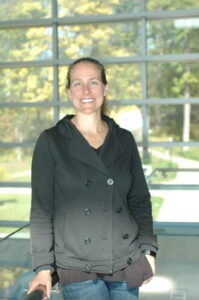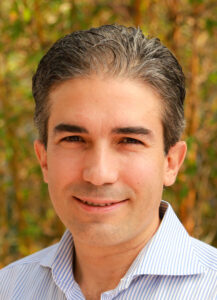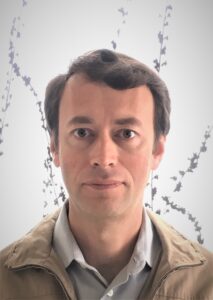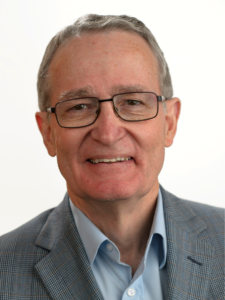
Title: How Do We Learn to Use Learning in Manufacturing Systems
Abstract: Manufacturing has undergone significant changes over the past five-ten years thanks to technological advancements that have been leveraged to meet a diverse set of customer requirements driven by global and societal needs. Conventional manufacturing control strategies were typically designed for robustness and speed within a controlled and well-regulated environment. However, recent demands for customization and agility coupled with big data investments have provided an opportunity for more learning-based methods to be introduced. Data driven strategies have long provided a means of harnessing information to enhance the performance of these complex systems. This talk is motivated by real-world interest from industry in understanding how to combine data-based learning and experiential knowledge to make intelligent decisions that can save time, money, and resources. In this talk, we examine which aspects of manufacturing processes lend themselves to learning strategies and which bring additional challenges. We also explore cases in which learning has been applied in different ways to additive manufacturing processes in order to improve process knowledge and performance. Opportunities for additional integration of learning into the manufacturing domain will be discussed and open research questions for control-theoretic advancements will be highlighted.
Bio: Kira Barton is an Associate Professor in the Department of Mechanical Engineering and a Core Faculty member of the Robotics Institute at the University of Michigan. She received her B.Sc. in Mechanical Engineering from the University of Colorado at Boulder in 2001. She continued her education in mechanical engineering at the University of Illinois at Urbana-Champaign and completed her M.Sc. and Ph.D. degrees in 2006 and 2010, respectively. She held a postdoctoral research position at the University of Illinois from Fall 2010 until Fall 2011, at which point she joined the Mechanical Engineering Department at the University of Michigan at Ann Arbor. Kira conducts research in modeling, sensing, and control for applications in advanced manufacturing and robotics, with a specialization in Iterative Learning Control and multi-agent systems. Kira is the recipient of an NSF CAREER Award in 2014, 2015 SME Outstanding Young Manufacturing Engineer Award, the 2015 University of Illinois, Department of Mechanical Science and Engineering Outstanding Young Alumni Award, the 2016 University of Michigan, Department of Mechanical Engineering Department Achievement Award, and the 2017 ASME Dynamic Systems and Control Young Investigator Award.

Title: Contraction Theory in Systems and Control
Abstract: We survey a comprehensive theory on the application of the Banach contraction principle to control and dynamical systems. We start with some historical highlights. Next, we generalize the basic contraction property from discrete to continuous time, from Euclidean to non-Euclidean norms, from closed to open systems, and, finally, from single to interconnected systems. We then apply these theoretical tools to modern problems involving machine learning, multi-agent coordination, and optimal control. Finally, we conclude with strengths and weaknesses of the theory as well as open directions of research.
Bio: Francesco Bullo is a Professor with the Mechanical Engineering Department and the Center for Control, Dynamical Systems and Computation at the University of California, Santa Barbara. He was previously associated with the University of Padova (Laurea degree in Electrical Engineering, 1994), the California Institute of Technology (Ph.D. degree in Control and Dynamical Systems, 1999), and the University of Illinois. He served on the editorial boards of IEEE, SIAM, and ESAIM journals, as IEEE CSS President and as SIAG CST Chair. His research interests focus on contraction theory, network systems and distributed control with application to robotic coordination, power grids and social networks. He is the coauthor of “Geometric Control of Mechanical Systems” (Springer, 2004), “Distributed Control of Robotic Networks” (Princeton, 2009), and “Lectures on Network Systems” (Kindle Direct Publishing, 2022, v1.6). He received best paper awards for his work in IEEE Control Systems, Automatica, SIAM Journal on Control and Optimization, IEEE Transactions on Circuits and Systems, and IEEE Transactions on Control of Network Systems. He is a Fellow of IEEE, IFAC, and SIAM.

Title: Nonlinear systems with limited data: estimation, control and synchronization
Abstract: The general focus of this talk is on nonlinear control systems in which only limited amounts of data can be exchanged between different parts of the system. In such systems, a control designer is faced not just with the task of developing a control algorithm, but also with deciding whether a given objective is achievable with the available data, or with characterizing the minimal data needed to meet the objective. In this context, we consider two specific problem settings. We first address state estimation and model detection with finite data rate. Our unifying approach to these two tasks relies on a notion of entropy for dynamical systems. We then discuss observer design with guaranteed robustness to measurement errors. This problem is motivated in part by applications involving synchronization with limited data.
Bio: Daniel Liberzon was born in the former Soviet Union in 1973. He did his undergraduate studies in the Department of Mechanics and Mathematics at Moscow State University from 1989 to 1993.
In 1993 he moved to the United States to pursue graduate studies in mathematics at Brandeis University, where he received the Ph.D. degree in 1998 (supervised by Prof. Roger W. Brockett of Harvard University). Following a postdoctoral position in the Department of Electrical Engineering at Yale University from 1998 to 2000 (with Prof. A. Stephen Morse), he joined the University of Illinois at Urbana-Champaign, where he is now a Richard T. Cheng Professor in the Electrical and Computer Engineering Department and a professor in the Coordinated Science Laboratory. His research interests include nonlinear control theory, switched and hybrid dynamical systems, control with limited information, and uncertain and stochastic systems. He is the author of the books “Switching in Systems and Control” (Birkhauser, 2003) and “Calculus of Variations and Optimal Control Theory: A Concise Introduction” (Princeton Univ. Press, 2012). His work has received several recognitions, including the 2002 IFAC Young Author Prize and the 2007 Donald P. Eckman Award. He delivered a plenary lecture at the 2008 American Control Conference. He is a fellow of IEEE and IFAC, and an Editor for Automatica (Nonlinear Systems and Control area).

Title: Power System Dynamics and Control – Structure, data and learning
Abstract: The field of decision and control has played a critical role in establishing the electrical power grid, which has been referred to in terms like “the largest”, “the most complex” machine made by humans. The National Academy of Engineering, USA, actually named ‘electrification’ as first in a list of the Greatest Engineering Achievements of the 20th Century. The stability analysis and control of the electrical grid have evolved over about 100 years via solving problems arising in its development into a wide-area granulated network operated by layers of control and market mechanisms. Classical control and many applications of more mathematical approaches, including linear and nonlinear system theory, various optimization methods, Lyapunov theory, adaptive and robust control, have been utilized. Before the term ‘smart grid’ arrived in the early 2000’s this was indeed arguably a very impressive achievement.
Now in many parts of the world, the electrical system is undergoing two major transitions, which are briefly described as 1) decarbonisation, i.e. of the existing grid, and 2) distributed energy resources (DERs), i.e. mainly rooftop solar PV, along with greater electrification in households and transport. These transitions are already leading to different dynamics at all levels as large conventional generators (fossil fuel, nuclear) give way to high levels of converter-fed generation, adding grid energy storage and a new demand-side structure including EVs, batteries and DERs. These technologies and associated changes in policies, regulations and markets will render the aforementioned analysis and control methods and structures obsolete with many new problems. Given emissions targets by dates typically between 2025 and 2050, there is no luxury of 100 years to solve them one by one. In particular, the future control problem can now be viewed as basically an end-to-end distributed one using limited flexibility in generation, network and demand-side resources, all embedded in the changing weather system. This creates many new opportunities for research and development, which will use systems, decision and control and related computing sciences.
The talk will firstly review power network dynamic analysis and control around the themes of exploiting network structure, data availability and recent learning approaches to address the classical problems of computing stability limits for synchronization, frequency and voltage stability. Then the opportunities for research on the new problems arising in the energy transitions will be addressed. In particular, the capability for system resilience beyond security and reliability remains a major goal to be achieved.
Bio: David J. Hill is Professor Emeritus in the School of Electrical and Information Engineering, The University of Sydney, Australia. In November 2022 he will become Professor of Power and Energy Systems in the Department of Electrical and Computer Systems Engineering, Monash University, Melbourne, Australia. During 2013-2020, he held the Chair of Electrical Engineering at the University of Hong Kong. He has also held academic and substantial visiting positions at the universities of Melbourne, California (Berkeley), Newcastle (Australia), Lund (Sweden), Munich, City University of Hong Kong, Australian National University and The University of NSW Sydney. His research activities have been in power and energy systems, control systems, networks, learning systems and stability analysis. His work is now mainly focussed on issues for future energy and power networks where he aims to bring systems and information sciences to accelerate the clean energy transition. He is also a consultant in the area of power and energy issues in Australia and internationally. He is a Fellow of SIAM, IFAC, the Australian Academy of Science, the Australian Academy of Technological Sciences and Engineering and the Hong Kong Academy of Engineering Sciences. He is also a Foreign Member of the Royal Swedish Academy of Engineering Sciences. He received the 2021 IEEE Power and Energy Society Prabha S. Kundur Power System Dynamics and Control Award.